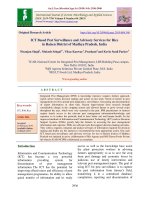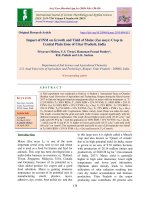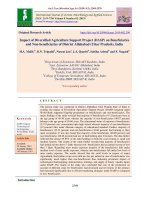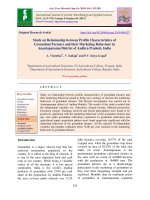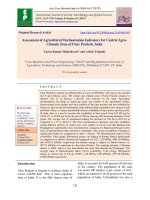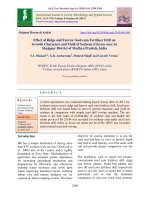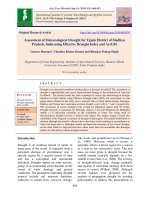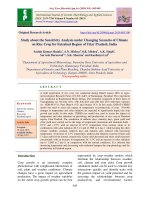Economic aspect of dairy farm-keeping in Jaunpur district of Uttar Pradesh, India
Bạn đang xem bản rút gọn của tài liệu. Xem và tải ngay bản đầy đủ của tài liệu tại đây (254.07 KB, 5 trang )
Int.J.Curr.Microbiol.App.Sci (2019) 8(4): 2574-2578
International Journal of Current Microbiology and Applied Sciences
ISSN: 2319-7706 Volume 8 Number 04 (2019)
Journal homepage:
Original Research Article
/>
Economic Aspect of Dairy Farm-Keeping
in Jaunpur District of Uttar Pradesh, India
Avanish Kumar Singh*
Department of Agricultural Economics, Tilak Dhari P.G. College,
Jaunpur-222 002 (UP), India
*Corresponding author
ABSTRACT
Keywords
Dairy farm, Net
income, Milk
production, Live
stock and Cost
benefit ratio
Article Info
Accepted:
17 March 2019
Available Online:
10 April 2019
The present investigation is an attempt to study in the title “Economic aspect of dairy
farm-keeping in jaunpur district of Uttar Pradesh” specifically, it aims (i) to work out the
economics of milk production in different size of dairy units. (ii) to work out the net
income and as cost/liter of a dairy farms. (iii) to identify the various constraints in milk
production and to suggest measures for promoting live stock development. The study is
based on data collected from 16 progressive dairy units in semi-urban areas of Jaunpur
district of Uttar Pradesh. The analysis of dairy units revealed that the average cost of milk
production is Rs 17.20/liter. The gross returns were found to be highest in cost of large
size group as compared to small and marginal groups. The net return after meeting out the
cost of production was follow to be highest in large size of dairy units follow by medium
and small. The benefit-cost ratios have amply demonstrated profitability of raising dairy
farm-keeping on all the size of dairy units. The cost-benefit ratio (BCR) was highest in
small size groups. Dairy farmer in different size groups are getting profit from dairy farm.
Introduction
India ranks first in milk production, according
18.5 percent of world production, achieving
an annual output of 146.3 million tons during
2014-15 as compared to 137.69 million tons
during 2013-14 recording a growth of 6.26
percent.
The per capita availability of milk in India has
increased from 176 gms per day in 1990-91 to
322 gms per day by 2014-15. It is more than
the world average of 294 grams per day
during 2013 (Economic Survey 2015-2016).
In India state of Utter Pradesh milk Producing
state and hold a share of more than 17% in the
total milk production in India. Apart from
being the largest milk producer. Uttar Pradesh
also has the largest number of Cows &
Buffaloes, which is more than 1.8 crore.
Dairy is a business enterprises established for
the harvesting or processing of milk (or both)
of animals milk, mostly from cow and
buffaloes for human consumption. These
animals are source of milk income,
2574
Int.J.Curr.Microbiol.App.Sci (2019) 8(4): 2574-2578
employment & poverty relief. The present
study has been undertaken with the fallowing
objectives1.To work out the economics of milk
production in different size of dairy units.
2.To estimate the net return and as cost of
production per litre in size groups of dairy
farms.
3.To identity the various constraints in milk
production and suggest measures for
promoting live stock development.
Materials and Methods
The present study was undertaken in Jaunpur
district of Uttar Pradesh. It is based on data
collected from 16 sample progressive dairy
farms of different categories. In semi-urban
areas of jaunpur district during the year 20152016.
The dairy farmer keeping form owners are
dairy farm. The primary data were collected
from the sample of 16 progressive dairy farm
selected from 4 blocks (purposively selected
on the basis of maximum number of dairy
farms in these blocks), on a pre-tested
schedule through personal interview method.
The number of animals was the basis for
formation of strata’s i.e. small (minimum 14),
marginal (16-25) and large size (above 25)
form each size groups 6, 8 and 2 dairy units
were randomly selected.
The data collected include information
regarding total cost of production i.e.
expenditure in covered of feed & fodder,
animal care, cattle shade, labor expenses,
price of fodder, concentrate & roughens, milk
yield per year per day, price of milk, number
of mulch animals, net income etc. under
difference size of dairy units. The data were
analyzed using statistical tools like average,
percentage, ratio and mean etc.
Results and Discussion
Animal possession according to size of
dairy units
The finding obtained from the present study
are presented in Table 1 reveals that the
maximum number of cow were found in
maximum size groups (20) followed by small
(16) and large size groups (12) respectively.
Numbers of calves (cow) were also found
maximum in medium (10) with 07 and 06
calves in small and medium size groups
respectively. Average number of buffaloes
and its calves per dairy units were found
26.99, 30.15 and 42.86 percent for small
medium and large size groups respectively. It
indicates that average number of buffaloes
and its calves are more in each size group
than the cow and calves.
Thus, it could be calculated that the average
number of livestock (both cow and buffaloes)
increase with increase in size groups.
Operational and fixed cost for milk
production
Table 2 reveals that the total cost per animal
per year was highest in medium size groups
fallowed by small and large size groups
followed by small and large size groups. It
was Rs 86858.29, 96705.10 and Rs 90054.45
for small and large size groups respectively. It
was observed that the maximum portion
(96.93 percent) of total cost was covered by
operational cost in all size groups. The
operational cost increases as the size group’s
increase. As for as fixed cost is concerned, it
decreases as the size groups increases. Under
operational cost in different size groups. The
feed cost per animal per day was observed
maximum and minimum, i.e., 80.11 and 63.04
for medium and small size group respectively.
Total cost per animal per day was also found
to be of the same trend as that of total cost per
2575
Int.J.Curr.Microbiol.App.Sci (2019) 8(4): 2574-2578
animal per year. Therefore, it can be
concluded that the total cost of animal milk
production was observed highest in medium
size groups followed by large and small size
groups. The much portion of total cost is
covered by operation cost in all the size
groups. On an average, the feed costs per year
per day were observed to be Rs 72.350and
total cost per year per day Rs 294087 in all
size groups.
Marking channel is also insufficient.
Poor road and inadequate transport facility
due to which marketing cost is high.
Cattle raising are a high risk business.
Prevention of cattle disease is inadequate and
replacement is a costly.
Net income from different size of dairy
units
The need for live-stock development
production is pressing giving the rapidly
growing demand from animal product and
important contribution of live stock to the
incomes and welfare of rural poor.
The returns were computed using prevailing
marked prices of output and input. The details
of which is presented in Table 3. It could be
observed that the gross income per year
increases as size group increases. It was Rs
12646.00, Rs 131939.43 and Rs 133458.37
for small, medium and large size groups
respectively. The gross expenses have been
observed in medium size groups. It was Rs
59910.02, Rs 59029.16 and 55074.02 for
medium, large and small groups respectively.
The net income per animal per year was
observed in small, medium and large size
groups. It was Rs 71390.98, Rs 72389.43 and
Rs 74789.23 for small, medium and large
respectively. On an average the cost of
production per liter of milk was observed to
be Rs 14.21 for all size groups respectively.
The benefit -cost ratio (BCR) for per animal
was highest in small size groups followed by
large and medium size groups. It was Rs 2:30,
2:26 and 2:20 for small, large and medium
size groups respectively. Thus, it can be
concluded that the respectively in different
size groups are getting profit from dairy
enterprises in the study area.
Problem faced by farmer
Farmer or grower are faced main problem of
the supply of milk is of inadequate feed and
over stocking the grazing land.
Suggestions
Promoting livestock development
The following measures are suggested for the
development of dairy farm keeping.
More research is needed on improved animal
husbandry and production system.
Area under folder crop and production of
grazing land should be increased.
Fixation of minimum milk price, and promote
extension services, health care and marketing
facilities for milk production.
Summary and conclusion are as follows:
The present investigation is an attempt to
study in the title “Economic aspect of dairy
farm-keeping in jaunpur district of Uttar
Pradesh” specifically, it aims (i) to work out
the economics of milk production in different
size of dairy units. (ii) to work out the net
income and as cost/liter of a dairy farms. (iii)
to identify the various constraints in milk
production and to suggest measures for
promoting live stock development. The study
is based on data collected from 16 progressive
dairy units in semi- urban areas of Jaunpur
district of Uttar Pradesh during the year 201516. The analysis of dairy units revealed that
the average cost of milk production is Rs
17.21/liter.
2576
Int.J.Curr.Microbiol.App.Sci (2019) 8(4): 2574-2578
Table.1 Animal possession in different size of dairy units
Size Group
Small
Dairy Unit
06
Medium
08
Large
02
Total
16
Cow
16
(33.33)
20
(41.67)
12
(25.00)
48
(100)
Calves /Heifers
07
(30.43)
10
(43.47)
06
(26.09)
23
(100)
Sub Total
23
(32.40)
30
(42.25)
18
(25.35)
71
(100)
Buffaloes
24
(24.49)
32
(32.65)
42
(42.86)
48
(100)
Calves/Heifers
10
(35.71)
06
(21.43)
12
(42.86)
28
(100)
(in Numbers)
Sub Total
Totals
34
57
(26.99)
(28.93)
38
68
(30.15)
(34.52)
54
72
(42.86)
(36.55)
126
197
(100)
(100)
Table.2 Operational and fixed cost for milk production
Cost Items
Operational
cost
Fixed
expenses
Labour
expenses
Interest on
work in
capital
Fixed cost
Depreciation
on fixed
capital
Interest on
fixed capital
Total
Small
Per
Per
Animal/year Animal/Day
40759.55
111.67
(46.93)
23010
63.04
(26.50)
4200.00
11.50
(4.84)
2088.00
5.72
(2.40)
8400.12
(9.67)
3594.60
(4.13)
23.01
4805.52
(5.33)
86858.29
(100)
13.16
Size Group
Medium
Per
Per
Animal/year Animal/Day
45791.73
25.45
(43.35)
29243.43
80.11
(30.24)
3392.65
9.29
(3.51)
2504.35
6.86
(2.59)
7886.47
(8.16)
3380.95
(3.50)
21.60
4505.52
(4.66)
96705.10
(100)
12.34
9.84
237.96
9.26
264.94
(in Rupees)
Average of all size group
Large
Per
Animal/year
43077.55
(43.84)
26978.09
(29.96)
3055.94
(3.39)
2170.17
(2.41)
Per
Animal/Day
118.02
73.91
8.37
5.94
7386.35
(8.20)
3180.95
(3.53)
20.23
4205.40
(6.67)
90054.45
(100)
11.52
8.71
246.72
Per
Animal/year
43209.61
(47.38)
26410.67
(28.96)
3549.53
(3.90)
2254.17
(2.47)
Per
Animal/Day
118.38
7890.98
(8.65)
3385.50
(3.71)
21.61
4505.48
(4.94)
91205.94
(100)
12.34
72.35
9.72
6.17
9.27
249.87
Table.3 Net returns from dairy units
Particulars
Gross Income
Gross expenses
Net Income
Net profit/liter milk
Cost of
production/liter
Price of milk Rs/liter
Benefit-cost ratio
(Rs/Animal)
Size Group
Average of all size group
Small
Medium
Large
Per Animal/
Per
Per Animal/
Per
Per Animal/
Per
Per Animal/ Per Animal/
Year
Animal/day
year
Animal/day
year
Animal/day
year
day
126465
346.47
131939.43
361.47
133458.37
365.63
130620.93
357.86
55074.02
150.88
59910.02
164.13
59029.16
161.72
58004.40
158.91
71390.98
195.59
72389.43
198.32
74789.23
204.90
72856.54
14.21
3.07
2.99
3.18
199.60
14.39
14.36
132.88
3.08
-
50
2:30
-
40
2:20
2577
-
30
2:26
-
40
2:25
Int.J.Curr.Microbiol.App.Sci (2019) 8(4): 2574-2578
The gross returns were found to be highest in
cost of large size group as compared to small
and marginal groups. The net return after
meeting out the cost of production was follow
to be highest in large size of dairy units
follow by medium and small.
The benefit-cost ratios have amply
demonstrated profitability of raising dairy
farm- keeping on all the size of dairy units.
The present study was undertaken in Jaunpur
district of Uttar Pradesh in order to throw
light on economic aspect of dairy farmkeeping.
The study revealed that the total cost
(operational and fixed cost) of milk
production increases size groups increases,
the net income follow). The major portion of
total cost is covered by operational cost in all
the size groups. It can be concluded that dairy
enterprises is economically viable in Jaunpur
district.
References
Acharya, T.K.T. and Pawar, T.G. (1980). The
economics of milk production by
different types of milk animal. Indian
journal of agricultural economics,
35(4); 153.
Ganesh, B.K., Sharma, S. and Pandean, A.
(2003). Study on cost of milk
production in the milk shade area of
Tamilnadu. Indian Journal of animal
science, 73(8); 920-923.
Kunal, L.B., Gaddi. G.M. and Megeri, S.N.
(1997). Study on comparative economic
analysis of different breeds of cows.
Dharwad dist. of Karnataka state.
Agriculture Banker, 30(3); 44 -47.
Sarawgi, A.K. and Viaidya, P.K. (2000).
Economics of buffalo and cow milk
production in Jabalpur dist. of Madhya
Pradesh. The Bihar journal of
agricultural marketing, vol.VIII. No.4,
Oct-Dec.
How to cite this article:
Avanish Kumar Singh. 2019. Economic Aspect of Dairy Farm-Keeping in Jaunpur District of
Uttar Pradesh, India. Int.J.Curr.Microbiol.App.Sci. 8(04): 2574-2578.
doi: />
2578

